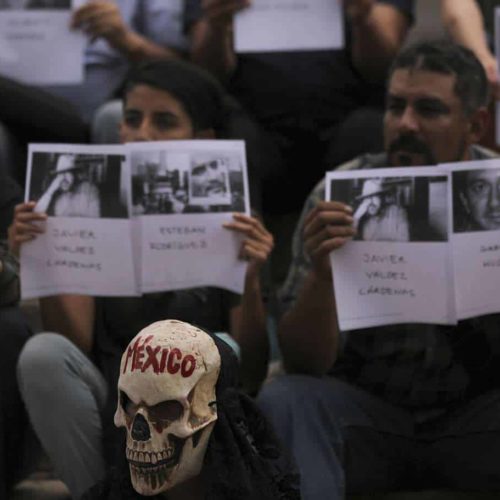Introduction
In Mexico, it’s been called a “crisis of freedom of expression.”
That’s a modest assessment. For Mexican journalists, this crisis can mean death for those who investigate one of the country’s biggest stories: organized crime groups and their grip on vulnerable communities and institutions.
On May 15, respected reporter Javier Valdez Cardenas, 50, who wrote for multiple outlets, became the latest victim to be silenced — the sixth Mexican journalist to be killed this year.
Valdez was pulled from his car and shot to death in Culiacan, a city in Mexico’s Sinaloa state. The Pacific coast state exports winter vegetables to the United States and hosts a bustling seafood industry. But it’s also home to brutal drug cartels battling over turf.
On Thursday, June 15, a month after Valdez’s killing, journalists in the United States and other countries are joining Mexican colleagues to say, “basta,” enough.
The singular focus of this campaign is to support Mexican colleagues with a call for the Mexican government to better protect journalists, and to ensure thorough investigation and prosecution that those responsible are brought to justice. This collective call for better protection is linked by this hashtag: #ourvoiceisourstrength.
It’s common knowledge in Mexico that American journalists and those in many other countries can report on suspected corruption or other controversy with far fewer risks than their Mexican colleagues.
Valdez was a go-to journalist in Mexico, sought out by CNN and other foreign media for his insight into the intersection between poverty, organized crime and corruption inside terrorized communities. Cartels are known to offer a choice to those they terrorize: “Plata o plomo,” silver or lead, meaning money or bullets.
Valdez not only founded Riodoce, a weekly paper in Sinaloa, he was also a correspondent for La Jornada, an influential daily newspaper based in Mexico City, and a contributor to Agence France Presse, the international newswire. In addition, he earned high honors for his reporting from the Committee to Protect Journalists and Columbia Journalism School.
Valdez’s book, The Taken: True Stories of the Sinaloa Drug War, was published in English in January.
Mexico has long struggled with crime and impunity for those who perpetrate it. But attempted government crackdowns and cartel feuds have in recent years helped make the country one of the deadliest in the world for journalists, according to the Committee to Protect Journalists.
Based in New York, CPJ counts 95 journalists killed in Mexico since 1992. In 41 of those cases, the victim’s work was confirmed as the motive for the killing. Still, most of the crimes have gone unresolved.
In 2011, when Valdez received its annual Press Freedom award, CPJ acknowledged Valdez’s will to continue reporting. The group said: “In a country where widespread self-censorship is the consequence of violence by drug syndicates and criminal gangs, Valdez still covers sensitive issues.”
When he accepted the CPJ award in New York, Valdez said in a speech: “Where I work, Culiacan, in the state of Sinaloa, Mexico, it is dangerous to be alive, and to do journalism is to walk on an invisible line drawn by the bad guys—who are in drug trafficking and in the government— in a field strewn with explosives. This is what most of the country is living through.”
He added: “This is a war, yes, but one for control by the narcos. But we the citizens are providing the deaths, and the governments of Mexico and the United States, the guns.”
The same year, Columbia University’s School of Journalism awarded Valdez with a prestigious Maria Moors Cabot prize for reporting that enhances inter-American understanding.
Both federal authorities and those in Sinaloa have said they are investigating Valdez’s murder. Mexican President Enrique Pena Nieto called Valdez’s killing an “outrageous crime” and tweeted that Mexico is committed to press freedom, which is “fundamental to our democracy.”
Valdez’s killers reportedly shot him to death near the offices of Riodoce. In 2009, after the publication ran a series about drug trafficking, it was hit and damaged by a grenade.
In a statement following Valdez’s murder, Agence France Presse’s global news director Michele Leridon said: “We call on the Mexican authorities to shed all possible light on this cowardly murder.”
CPJ executive director Joel Simon added that Valdez’s death “is a blow to Mexican journalism and to the Mexican public, who see a shadow of silence spreading across the country.”
Columbia University’s Cabot prize jury spoke out as well. The jurors called on Mexican officials “to put an end to the vicious cycle of violence and impunity that is decimating the Mexican media.”
Center for Public Integrity senior reporter Susan Ferriss was a Latin America correspondent based in Mexico City for the Atlanta Journal-Constitution and the Cox Newspapers chain between 1997 and 2006.
Read more in Inside Public Integrity
Inside Public Integrity
Center for Public Integrity sues Federal Election Commission
Agency won’t release internal emails, communications with White House
Inside Public Integrity
Center for Public Integrity wins seven Dateline Awards
Most among online news organizations in D.C.-area contest


Join the conversation
Show Comments